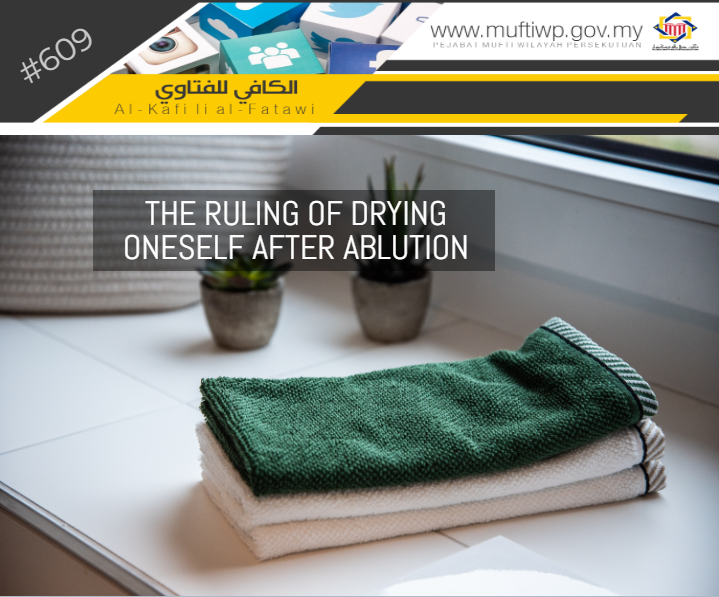Question:
What is the ruling for me to dry my wet body parts after ablution, such as by wiping it with a towel or tissue or drying them with a dryer?
Answer:
Alhamdulillah, praise and thanks to Allah for the many countless blessings He has blessed us all with. Blessings and salutations to the Prophet Muhammad PBUH, his wives, his family, companions and all those that follow his teachings to the day of judgement.
Fiqh scholars have differing opinions regarding this issue. Some of them state that it is permissible. While others said that it is makruh (undesirable) for someone to dry himself after ablution.
The opinion that state that it is permissible supported their opinion with the Islamic legal maxim which state that the original ruling for anything is its permissibility unless there is evidence that prohibit it:
الأَصْلُ فِي الأَشْيَاءِ الإِبَاحَة
“The original ruling of something is its permissibility.”
They said that as long as there is no Quranic or prophetic evidence that prohibit it, then its original ruling is applicable. This is the opinion of scholars such as Imam Ahmad and others. Imam Ibn Qudamah al-Maqdisi Rahimahullah said: It is permissible for someone to wipe himself to get rid of the water from ablution or bath. This is the opinion stated by Imam Ahmad. The matter of wiping oneself after ablution is narrated by Uthman, al-Hasan bin Ali, Anas bin Malik and most scholars. This is the strongest opinion for the original ruling for something is its permissibility. Refer Al-Mughni, Ibn Qudamah (1/195).
Whereas for the second opinion, wiping or drying oneself after ablution is makruh (undesirable), this opinion is supported by a hadith from Maimunah R.Anha, where he said:
فَأَتَيْتُهُ بِخِرْقَةٍ، فَلَمْ يُرِدْهَا، فَجَعَلَ يَنْفُضُ بِيَدِهِ
“I brought a piece of cloth, but he did not take it and removed the traces of water from his body with his hand.”
Sahih al-Bukhari (274)
The same is stated in a hadith from Abdullah Ibn Abbas R.Anhuma, he said:
أَنَّ النَّبِيَّ صلى الله عليه وسلم اغْتَسَلَ فَأُتِيَ بِمِنْدِيلٍ فَلَمْ يَمَسَّهُ وَجَعَلَ يَقُولُ بِالْمَاءِ هَكَذَا
“The Prophet (ﷺ) performed Ghusl and a cloth was brought to him, but he did not touch it, and he started doing like this with the water. [1] [1] This is a demonstration of his wiping off the water on his body with his hands.”
Sunan al-Nasa’i (255)
Both hadiths clearly state that the Prophet PBUH did not use a cloth given to him to wipe his body after the obligatory bath. Thus, scholars who hold the second opinion use the hadiths as evidence stating that it is makruh to wipe oneself after ablution with a cloth or others.
According to Syafieyyah scholars, there are several opinions regarding this issue. This is stated by Imam al-Nawawi, he said: The first opinion state that it is not makruh to do so, but it is sunnah to leave it. This is the opinion of the majority of scholars in Iraq, al-Qadhi Husain, Imam al-Baghawi, Imam al-Haramain and Imam al-Rafi’e.
The second opinion state, it is makruh. This is stated by Syeikh al-Mutawalli. While the third opinion said that it is permissible for both; wiping or not wiping oneself after ablution. This is the opinion of al-Syeikh Abu Ali al-Thabari and al-Qadhi Abu al-Thayyib. The fourth opinion state, the act of wiping oneself after ablution is sunnah for it will prevent specks of dust, najis and others from sticking or adhering to him. This is stated by al-Syeikh al-Furani, Imam al-Ghazali, al-Ruyani and al-Rafi’e. For the fifth opinion, if it is in summer then it is makruh. However, it is not makruh in winter (cold season) for there is a facilitation since it is cold. This is the opinion of Imam al-Rafi’e.
Imam al-Mahamili Rahimahullah said: Imam al-Syafie do not have any opinion on this matter. Syafieyyah scholars said: The act of wiping water after ablution or bath, even if there is no need for it, such as fear of the cold or najis and others, it is not makruh but considered as khilaf mustahab (contradicts what is considered as sunnah).
Subsequently, Imam al-Nawawi said: The chosen opinion in our madhhab is that it is sunnah to leave the act. And it is not considered as makruh. Imam Ibn Munzir said that the act of wiping oneself after ablution is permissible as stated by Saidina Uthman bin Affan, al-Hasan bin Ali, Anas bin Malik, Basyir bin Abi Mas’ud and Imam Hasan al-Basri. While Jabir bin Abdillah R.anhuma, Abd al-Rahman bin Abi Laila, Sa’id Ibn Al-Musayyib and others ruled it makruh. As for al-Mahamili, he said, the scholars have agreed that it is not prohibited, while they have differing opinions as to whether it is makruh or not. See Al-Majmu’ Syarah Al-Muhazzab Al-Nawawi (1/462).
Conclusion
After analysing the above opinions of scholars, we are inclined towards the opinion that state it is permissible to dry oneself with towel or others after ablution. This is after considering the action of the Prophet PBUH who wiped himself using his hands and the statement of al-Syeikh al-Mahamili where the scholars have agreed that it is not prohibited and there is a necessity to wipe oneself to prevent the feeling of unease while worshipping. May Allah SWT give us the true understanding in His religion. Amin.


